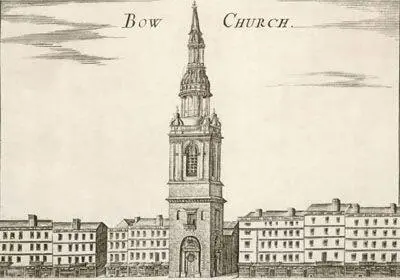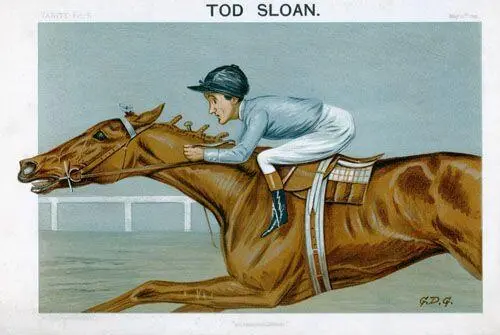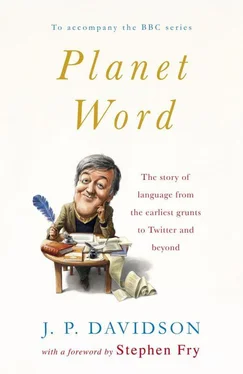
Born within the sound of Bow Bells and you are officially a Cockney
Rabbit on ( rabbit and pork — talk)
Use your loaf ( loaf of bread — head)
Have a butchers ( butcher’s hook — look)
Don’t say a dicky bird (word)
Blow a raspberry ( raspberry tart — fart)
Tell a porky ( pork pie — lie)
On your tod ( Tod Sloan — alone)

Tod Sloan, the American jockey, introduced the ‘monkey crouch’
There are snippets of social history hidden in some of these phrases. Tod Sloan was an American jockey who became an international celebrity at the turn of the twentieth century. He introduced the ‘monkey crouch’ forward seat riding position to horse racing and rode British winners at Newmarket and Ascot. The Broadway hit song ‘Yankee Doodle Boy’ was about him: ‘Yankee Doodle came to London, just to ride the ponies …’
Sometimes with slang, the more people that understand it, the more you have to change it. If they work out that china plate means ‘mate’, you drop the rhyme word and just say china . Or if they unravel what to kick someone in the cobblers awls means, then you shorten it to cobblers . Or the orchestras (stalls). Or the Niagras (Falls). The rhyming slang for ‘arse’ is especially confusing. The first rhyme was bottle and glass , then simply bottle , then Aristotle and finally aris . This is occasionally extended further to April (in Paris) and you’re left with a sentence like ‘She fell on her April .’
Rhyming slang words can be passed down through the generations or they might be hugely popular for a few years and then be overtaken by the next fad. Some words depended on knowledge of London. If someone threatened to kick you in the Hampsteads , you had to be familiar with Hampstead Heath to know it meant teeth. People still talk about going to the barbers to get their barnet cut. This word for hair has been around since at least the 1850s and comes from the popular Barnet Fair in north London. Hampton Wick (near Teddington) is rhyming slang for prick or dick and is often just Hampton or wick. He gets on my wick — meaning he’s annoying — is one of those innocuous phrases that’s actually rather rude. Spike Milligan managed to introduce a character called Captain Hugh Jampton into a Goon Show episode in 1958. The BBC banned a further appearance when they worked it out. The Carry On films had a field day. Lord Hampton of Wick appeared in Carry on Henry , and the nurse and doctor Carry On films were based at Long Hampton Hospital. And the first of the serials within The Two Ronnies TV show was called ‘Hampton Wick’.
By the mid twentieth century many rhyming slang expressions used the names of contemporary personalities, especially actors and performers. Ruby Murray was a Belfast-born singer, popular in the 1950s at the same time as Indian restraurants were becoming widespread. So today her name Ruby lives on as rhyming slang for a curry. ‘I’m going for a Ruby. ’ One of the rhyming slangs for deaf is Mutt and Jeff or simply mutton. I wonder how many people using the phrase know it comes from characters in an American comic strip created by Bud Fisher in 1907. Your grandmother might have got new Teds or Ted Heaths (false teeth). Or, referring to a more recent personality, you could say she’s got a nice pair of Penelopes (Keith). A pair of knickers are Alan Whickers or simply Alans , as in the film Lock, Stock and Two Smoking Barrels : ‘All right, all right, keep your Alans on!’
Rhyming slang can evolve more than one meaning. Woe betide if you have a name that rhymes easily. Actor Gregory Peck’s name was both ‘neck’ — get that down your Gregory (or as characters in the Minder TV show were constantly urging,‘Let’s get a Ruby down your Gregory’), and ‘cheque’ — I’m going to cash a Gregory . It can also be used in the plural, as in wearing my gregs — ‘specs’. A Melvyn , from the arts broadcaster Melvyn Bragg, has been used at various times to mean ‘shag’, ‘fag’ and ‘slag’. A Melvyn is not to be confused with a melvin, which, according to the Historical Dictionary of American Slang , means ‘pulling someone’s pants up sharply to wedge them between the buttocks’.
Television and films, the internet, texting and tweeting, together with a much greater racial and cultural mixing pot, ensure that most of the new rhyming slangs are ephemeral, discarded as quickly as the next celebrity or fad comes around. And yet, to mix a metaphor, amidst the chaff there are some gems. A market stall holder in London’s Soho was heard to say, ‘Oh, it’s the tourists … I’m not Listerine but they get on my goat.’ Rhyming slang for American is septic (from septic tank — Yank). So if you’re Listerine (a mouth-wash), you’re anti-septic , i.e. anti-American.
Some Cockney cabbies talk about how the Cockney they grew up speaking is gradually fading away.
‘Well, we’re losing it, aren’t we? But then, our way of life is changing, isn’t it? See, we used to have stall holders, in the markets, and their children would come up and they would learn the patter, and that was handed down. Well, now them children are going to university or whatever because they always try and do better for their children. You’ve only gotta look at your kids. Your kids are picking up the hip-hop type of language. As much as you try, when they’re at school they’re picking up the various patters. In the same way we used to, ’cos it was always Cockney that was spoken.’
One cabbie says his children still recognize some Cockney rhyming words but, as all slang does, they’ve evolved. So instead of asking his daughter whether she’s having a tin , meaning laugh (tin bath), he’ll ask her whether she’s having a bubble . The old tin bath isn’t around any more.
These cabbies reckon their rhyming acts as a sort of safety valve, helping to take the edge off offensive or racist labelling. They describe their fares as seppos (Yanks) or tiddly winks (Chinks), or fourbytwos, tinlids or front wheel skids (Jews and Yids).
‘A Cockney has got a cheerful way about him. So when he’s saying it, it’s not in an offensive manner, it’s in good fun, it’s always with a good humour. It’s always with a smile on his face.’
Rhyming slang is a bit like one of those minced oaths. We know we can’t say the taboo word so we come up with a cheerful alternative which makes us smile. Most of the time.
In rhyming slang a gay man might be a ginger (beer — queer) or King Lear (queer again) or iron (hoof — poof). But gay men know all about secret codes themselves. Back in the 1960s, homosexuality was still a crime, and gay men in London used a secret language to identity and secretly communicate with each other. The language was called Polari and it had a vocabulary of about twenty key words, mainly describing people’s looks, clothes and sexual availability: bona for good; omi man; palone woman; omi-palone gay man; eek face (from back-slang ecaf ); fabulosa wonderful; riah hair (back-slang); vada to look; naff not available for fucking; camp effeminate (also from Kamp, acronym for ‘known as male prostitute’); zhoosh to fix or tidy.
Читать дальше














